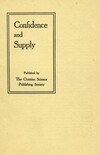

Are you sure?
This bookmark will be removed from all folders and any saved notes will be permanently removed.
"WHAT HAST THOU IN THE HOUSE?"
In II Kings, 4th chapter, we read of a woman who came to the prophet Elisha in great distress. She had no money to pay her debt, and the creditor had come to take her two sons to be bondmen. Elisha said: "What shall I do for thee? tell me, what hast thou in the house?" The woman answered that she had nothing but a little pot of oil. Then Elisha told her to borrow all the vessels she could get from her neighbors, and "borrow not a few;" or, as the new version has it, "scant not." He said also, "When thou art come in, thou shalt shut the door upon thee and upon thy sons, and shalt pour out into all those vessels, and thou shalt set aside that which is full." The woman obeyed; the vessels were filled. Then said Elisha, "Go, sell the oil, and pay thy debt, and live thou and thy children of the rest."
Here is one of the greatest lessons in all the great Book for those who are troubled about their livelihood. We all feel that we have our way to make or to maintain in the world. Most of us are wage-earners. We are all more or less under the dominance of fear — fear that competition is too keen for us, fear that we shall be numbered among the failures, fear that there is not room for all of us in the world of supply. Perhaps some of us have not taken even the first step away from fear; that is, we have not gone to God with our problem, as the woman went in her extremity. But to those who will go to God to-day with their fears and failures, God speaks plainly and clearly. "What hast thou in the house?" One answers, "Lord, I have pictures in my house that I have painted with the best that is in me, and no one will buy them; so I must starve." Another says, "Lord, I am a salesman. I have the gift of selling in my house, but no one will employ me; so I must starve." A third says, "Lord, I have a talent in my house, a very small talent, for it enables me to do no more than to black shoes; but competition is too keen for me, and I too must starve."
When the woman said that the pot of oil was all she had in her house, Elisha did not say, "Your oil is worthless. I will find you a post at court;" or, "Go and ask such and such a man for what you need, and he will give it you." He did not even say, "Go and plead with the creditor to wait for his money." He fixed her attention on the thing she had in her house, — the thing that represented to her material sense her whole substance and supply. He told her to borrow vessels, to borrow and "scant not." He knew that all substance is Mind and that God's supply is unlimited; that the divine source is inexhaustible. The woman trusted and obeyed, and the demonstration was complete.
Enjoy 1 free Sentinel article or audio program each month, including content from 1898 to today.
JSH Collections
This article is included in:
1912 - PAMPHLET
Confidence and supply
JSH-Online has hundreds of pamphlets, anthologies, and special editions for you to discover.
June 6, 1908 issue
View Issue-
THE LAW OF KINDNESS
REV. WILLIAM P. MC KENZIE.
-
"WHAT HAST THOU IN THE HOUSE?"
CONSTANCE SKINNER.
-
FEAR NOT
HELEN L. YOUNG.
-
TESTING THOUGHT
ADA J. MILLER.
-
LONGING
J. E. Breed
-
I do not quarrel with people who call Jesus God, if by...
Rev. N. S. Hoagland
-
False consciousness, or the false sense of life, is of the...
Rev. G. A. Kratzer
-
Is there Scriptural authority for healing disease by means...
Judge Septimus J. Hanna
-
THE LECTURES
with contributions from John Ellis Sedman, B. G. Carpenter, W. L. Swan, James M. Taylor, T. E. Boland, Frank Newell, W. R. Rathvon
-
MRS. EDDY TAKES NO PATIENTS
Editor
-
"THE DOCTOR IN POLITICS."
Archibald McLellan
-
"HIS HANDIWORK."
John B. Willis
-
FAITH OVERCOMING FEAR
Annie M. Knott
-
LETTERS TO OUR LEADER
Edward A. Kimball, Mary B. G. Eddy, Alfred Farlow, Anna T. Robinson, Howard L. Cheney, Sydney F. Miles, Edith M. Young, J. V. Dittemore, R. A. Gilliam, Frank R. Kinsley, Rose Festner
-
Twelve years ago, when Christian Science was brought...
Annie L. Sturtevant
-
It is now about a year since the Christian Scientists came...
William Letchford
-
Several years ago, while in Jacksonville, Fla., I was,...
Harriet E. Frazier
-
With my heart full of gratitude and love to our beloved...
Lillian Walker
-
For the countless blessings of Christian Science I would...
Mabel M. Beeson
-
Since Father Time stands still, and heaven is here,...
Cassius M. Loomis
-
FROM OUR EXCHANGES
with contributions from Frederick Campbell, Albert Parker Fitch, Roosevelt



